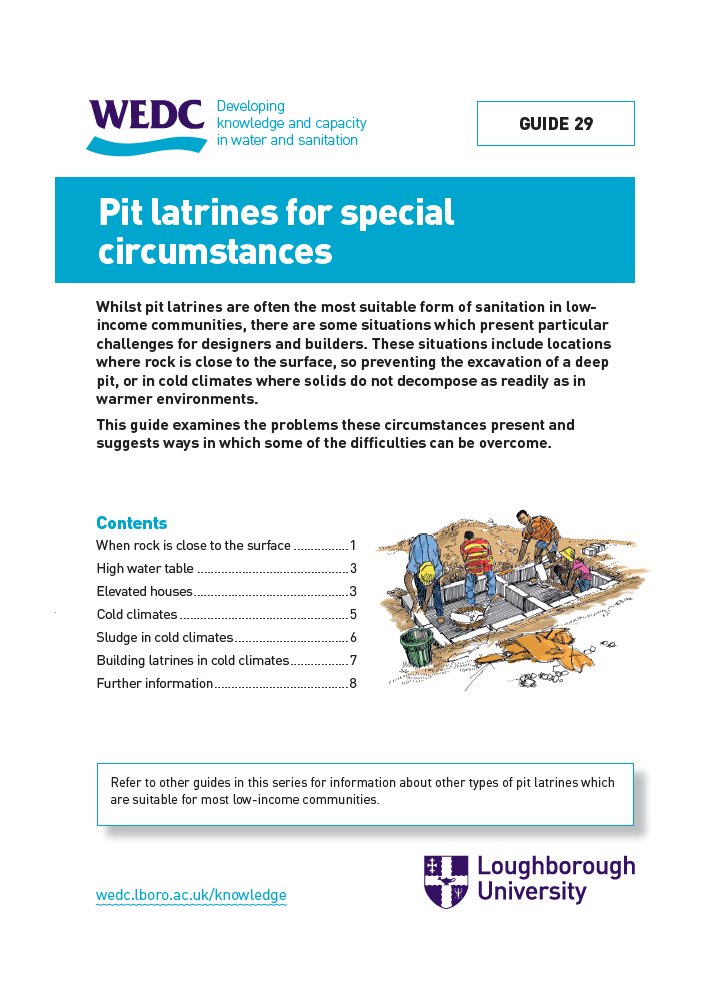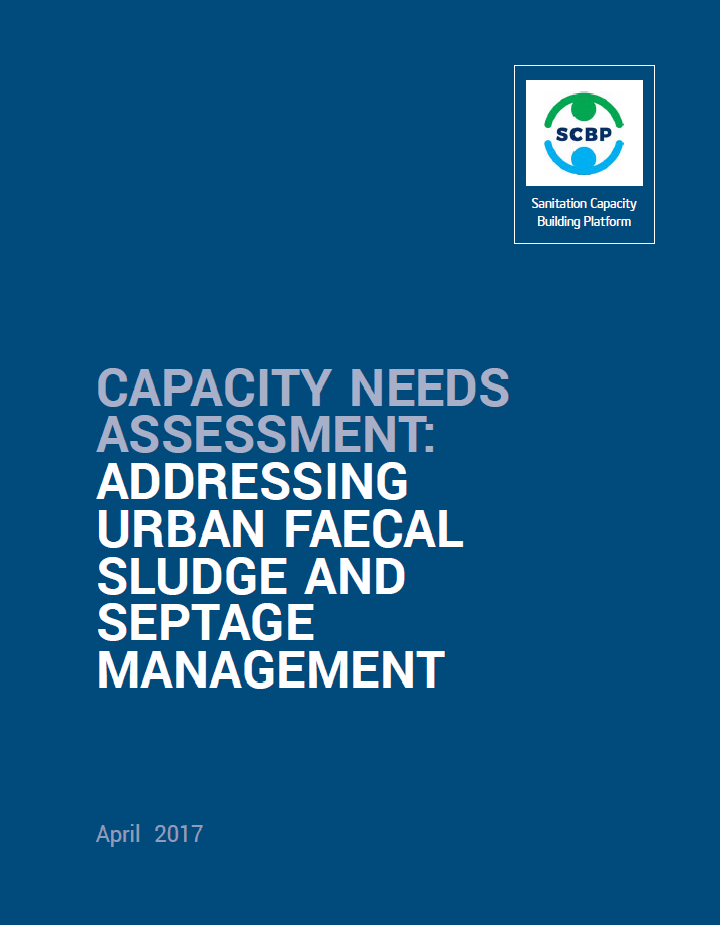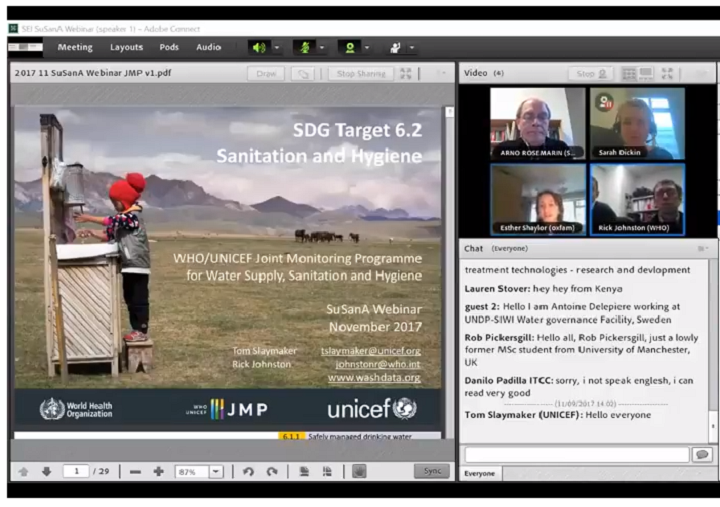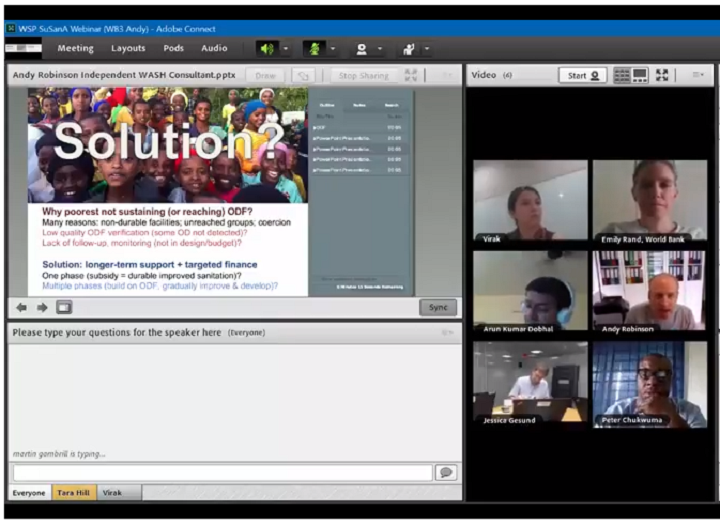WEDC (2017) Raised and elevated latrines Mobile notes
If ground has rock or groundwater close to the surface, it may not be possible to dig a hole deep enough even for a twin-pit latrine. In such cases pits can be raised above the ground. This short note illustrates ways of doing this.
WEDC (2014) Pit latrines for special circumstances
Whilst pit latrines are often the most suitable form of sanitation in lowincome communities, there are some situations which present particular challenges for designers and builders. These situations include locations where rock is close to the surface, so preventing the excavation of a deep pit, or in cold climates where solids do not decompose as readily as in warmer environments. This guide examines the problems […]
WEDC (2014) Latrine pit excavation and linings
The need for a latrine pit lining depends upon the type of latrine under construction and the condition of the soil. Septic tanks and aqua privies, for example, require watertight compartments so their pits are always lined. For a pit latrine, however, it is only necessary to line the pit if there is a possibility that it will collapse during its life span. This guide […]
WEDC (2012) Ventilated improved pit (VIP) latrines
The addition of a vent pipe to a simple pit latrine is one way of reducing the nuisance of flies in the cubicle if the cubicle is kept clean and dark. This type of latrine is called a ventilated improved pit (VIP) latrine. VIP latrines effectively control odour and flies while still allowing users to clean themselves with hard materials such as newspaper and leaves […]
Mara, D. D. (1984) Ventilated Improved Pit Latrines Guidelines for the Selection of Design Options
This Discussion Paper provides guidelines that will enable a design engineer to make a rational selection of the VIP latrine design option most appropriate to the community for which he is responsible. The designer is aiming at a technical choice that will be affordable to the householder and will give the best long-term service at the least cost. It is assumed for the purpose of […]
NIUA (2017) Addressing Urban Faecal Sludge and Septage Management Capacity Needs Assessment
Recognising city-level capacity limitations for decentralised sanitation planning and implementation in India, the Ministry of Urban Development (MoUD) appointed the National Institute of Urban Affairs (NIUA) as the anchor organisation for a Sanitation Capacity Building Platform (SCBP) to support cities in their sanitation planning and implementation. NIUA partnered with CAWST,2 a capacity development organisation, to design and initiate the SCBP with the goal of building […]
Reed, B. (2014) Latrine pit design
This guide examines some of the factors that need to be taken into account when planning and designing a latrine pit (or twin pits), including the location of a latrine, its shape, volume, liquid capacity and life.
Reed, B., Torr, D., Scott, R. (2016) Emergency Sanitation Developing Criteria for Pit Latrine Lining
Pit latrine linings for emergency sanitation facilities require different performance criteria from those for pits used in longer-term development work. Various international initiatives are currently under way to develop new methods of supporting the pits used for latrines in emergencies, but before a solution can be found, the problem needs to be defined. Current field guidance lacks the level of detail required by humanitarian workers […]
Harvey, P., Baghri, S., Reed, B. (2002) Emergency Sanitation Assessment and Programme Design
Perceptions of what constitutes an ‘emergency’ vary between personnel and between organisations. Generally, an emergency may be considered to be the result of a man-made and/or natural disaster, whereby there is a serious, often sudden, threat to the health of the affected community which has great difficulty in coping without external assistance. This book has been written to help all those involved in planning and implementing […]
Mosler, H.-J., Contzen, N. (2016) Systematic Behavior Change in Water Sanitation and Hygiene A practical guide using the RANAS approach
The Risks, Attitudes, Norms, Abilities, and Self-regulation (RANAS) approach to systematic behavior change is an established method for designing and evaluating behavior change strategies that target and change the factors influencing a specific behavior in a specific population. In brief, it is an easily applied method for measuring behavioral factors, assessing their influence on behavior, designing tailored strategies that change behavior, and measuring the effectiveness […]
Odhiambo, F., Reed, B. (2013) Hygiene promotion in emergencies Technical notes on drinking-water, sanitation and hygiene in emergencies
Communities affected by a disaster often lack basic water and sanitation facilities. They are likely to be traumatized and vulnerable to disease. Disruption of familiar practices or the relocation to new environments can result in a deterioration in existing hygiene behaviours. This, in turn, will contribute to an increased risk of disease transmission and epidemics. This technical note explains why hygiene promotion is important in […]
Ramos, M., Benelli, P., Irvine, E., Watson, J. (2016) WASH in Emergencies Problem Exploration Report Handwashing
Access to water, sanitation and hygiene promotion is one of the key aspects to securing the health status of populations affected by emergencies and humanitarian crises. The impact of hygiene promotion and washing of hands with soap has wider health implications, as hands are vectors that can transport disease agents from humans to humans, directly or indirectly. Furthermore, the ability to wash hands contributes to […]
Mara, D. D. (1996) Low-cost sewerage
Research and development undertaken by the World Bank during 1976-1986 has shown clearly that possession, proper use and maintenance of a sanitation facility are more important, in terms of improving health, than the actual sanitation technology employed, provided that it is affordable and socioculturally acceptable. Nevertheless, sanitation technology, sanitation technology choices have to be made, and the principal choice is between on-site and off-site systems. This […]
SEI, GIZ, UNDP-SIWI Water Governance Facility, CEPT University, Water Research Commission of South Africa, SuSanA (2018) Wastewater governance: Balancing different interests Policy Brief
Responsible, effective wastewater management is needed to address global water crises. This requires careful balance of the often-competing interests of stakeholders, as what poses a risk to the environment and public health may be a valuable resource to farmers and industry. How do we manage these different interests from a policy and practical perspective? At World Water Week 2017, Stockholm Environment Institute, GIZ, the UNDP-SIWI Water […]
ESF, ISC, SuSanA Secretariat, GIZ, Samhita Social Ventures, QCI, MMC, NIUA, EcoPro, Caya Construct, Water.org, ASCI, UNICEF (2018) SuSanA India Chapter Seminar in Panaji, Goa, 21st February 2018 Presentations of Speakers & Minutes of Meeting
The second SuSanA India Chapter meeting was held in Panaji, Goa, India on 21 February 2018 - just after the 50th Annual Convention of the Indian Water Works Association (IWWA). The seminar encouraged discussions on urban sanitation challenges, holistic approaches to sanitation as well as financing and monitoring sanitation to accelerate progress on SDGs. Please find the presentations of the meeting and the minutes below.
Mara, D. D. (1985) Design of Pour-Flush Latrines
The traditional solution to providing sanitation facilities in urban areas has been conventional sewerage, but this technology is so expensive that it is not generally affordable by low-income communities. World Bank research has shown that full health benefits can be obtained through the use of a variety of lower-cost alternative sanitation technologies. Although the user convenience level of these technologies is not necessarily as high […]
Reed, B. (2012) An Engineer’s Guide to Latrine Slabs
The design of a simple latrine slab is a basic structural problem for an engineer. However, as the slab forms a critical part of a sanitary facility for most people living in low-income countries, the design criteria also need to include issues relating to user preference, culture, gender, health, economics, maintenance and sustainability, as well as those related to construction where size, shape and surface […]
GSMA (2017) Sanergy - Exploring the use of mobile-enabled sensors to optimise sanitation waste collection in Kenya
In 2015, Container-Based Sanitation provider Sanergy was awarded a GSMA Mobile for Development (M4D) Utilities grant with SweetSense to install GSM and RFID enabled infrared sensors to record Fresh Life Toilet activity and estimate fill levels. Waste collectors and Fresh-Life Toilet Operators used the sensors to record servicing events and request assistance by swiping RFID tags. A mobile app was also developed to capture waste […]




















